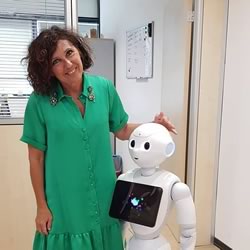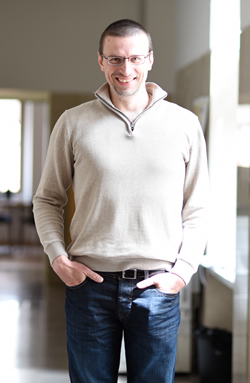@IUI 2021
Call for papers
The SOCIALIZE workshop aims to bring together all those interested in the development of interactive techniques that may contribute to foster the social and cultural inclusion of all users. More specifically, we intend to attract research that takes into account the interaction peculiarities typical of different realities, with a focus on disadvantaged and at-risk categories (e.g., refugees and migrants of first and second-generation) and vulnerable groups (e.g., children, elderly and disabled people). Among others, we are interested in human-robot interaction techniques aimed at the development of social robots, that is, autonomous robots that interact with people by engaging in social-affective behaviors, abilities, and rules related to their collaborative role.
The main topics of the workshop are (but not limited to):
* Multi-cultural system design;
* Empirical studies on the impact of culture on systems;
* Cultural and social influence in online learning platforms (e.g., MOOC);
* Cultural and social influence in recommender systems;
* Cultural and social aspects as contextual factors;
* Methods for automatic assessment of social and cultural background from social media;
* Strategies for adapting systems to groups of users with different backgrounds;
* Cross-cultural analyses of trust in systems;
* Human-robot adaptation for cross-cultural users, including under-represented groups;
* Personalized Human-Robot Interaction (HRI);
* Adaptation strategies for social HRI;
* Machine learning for social robots;
* Emotion and personality detection in social HRI;
* Social robots as conversational recommender systems
* Social robots in the real world;
Researchers and practitioners in academia or industry are encouraged to submit original manuscripts relevant to the audience of the workshop. The authors must limit them to 6 pages (not including references). Papers must comply with the standard ACM SIGCHI Paper Format
The contributions can be of two types: (1) full papers, including substantial work-in-progress, perspective papers, and lessons learned; and (2) challenge papers, describing research challenges in theory or practice, and defining new promising research directions.
Manuscripts must be submitted via Easychair (https://easychair.org/conferences/?conf=socialize2021) by December 23rd, 2020. All submissions will undergo a peer-review process. Reviewers will consider originality, significance, technical soundness, clarity, and relevance to the workshop’s topics. The reviewing process will be double-blind.
At least one author of each accepted position paper must register for and attend the workshop. Accepted contributions will be published in a joint volume of dedicated workshop proceedings.
PROGRAM
The workshop will be held online, Tuesday April 13, 2021
2:00 - 2:10 PM Welcome (10 min.) (CEST (UTC+2) time)
2:10 - 2.45 PM Keynote 1 (35 min.)
Antonella Poce
Designing Inclusive Learning Paths Through Digital Storytelling: A Pilot Experimentation In A Vr Interactive Etruscan Exhibition (30+5)
2:45 - 3:50 PM Session 1 (65 min.)
-
Noemi Mauro, Liliana Ardissono, Stefano Cocomazzi and Federica Cena
Information Extraction for Inclusive Recommender Systems (10+5)Alan Wecker, Tsvi Kuflik, Paul Mulholland, Belen Diaz-Agudo and Thomas Anthony Pedersen
Introducing empathy into recommender systems as a tool for promoting social cohesion (10+5)Giuseppe D'Aniello and Matteo Gaeta
Cultural Situation Awareness in e-Learning Systems (10+5)Federico Concone, Roberto Giaconia, Giuseppe Lo Re and Marco Morana
A Smart Assistant for Visual Recognition of Painted Scenes (15+5)
3:50 - 4:30 PM Break (40 min.)
4:30 - 5:05 PM Keynote 2 (35 min.)
-
Berardina Nadja De Carolis
Social Robotics in the Assistive Domain: Experiences and Perspectives (30+5)
5:05 - 6:20 PM Session 2 (75 min.)
-
Cristina Gena, Claudio Mattutino, Stefania Brighenti, Andrea Meirone, Francesco Petriglia, Loredana Mazzotta, Federica Liscio, Matteo Nazzario, Valeria Ricci, Camilla Quarato, Cesare Pecone, Giuseppe Piccinni
Sugar, Salt & Pepper - Humanoid robotics for autism (15+5)Berardina Nadja De Carolis, Francesca D'Errico, Giuseppe Palestra and Nicola Macchiarulo
Socially Inclusive Robots: Learning Culture-Related Gestures by Playing with Pepper (15+5)Alessio Ferrato, Carla Limongelli, Mauro Mezzini and Giuseppe Sansonetti
Fabio Gasparetti, Giuseppe Sansonetti and Alessandro Micarelli
Exploiting Micro Facial Expressions for More Inclusive User Interfaces (15+5)
Tourism Recommender Systems as a Vehicle for Social and Cultural Inclusion (10+5)
6:20 - 6:30 PM Discussion & Closing (10 min.)
 Antonella Poce currently holds the post of Associate Professor (qualified as a full professor), in Experimental Pedagogy at the department of Education – University Roma TRE, where she directs the Centre for Museum Education and the post graduate courses: annual Museum Education and biennial Advanced Studies in Museum Education. She coordinates national units within European project frameworks and she has been chairing international academic committees dealing with distance learning. She is author of different publications of national and international relevance on the topics of innovation, assessment and use of technology in teaching and learning, in the context of heritage fruition
Antonella Poce currently holds the post of Associate Professor (qualified as a full professor), in Experimental Pedagogy at the department of Education – University Roma TRE, where she directs the Centre for Museum Education and the post graduate courses: annual Museum Education and biennial Advanced Studies in Museum Education. She coordinates national units within European project frameworks and she has been chairing international academic committees dealing with distance learning. She is author of different publications of national and international relevance on the topics of innovation, assessment and use of technology in teaching and learning, in the context of heritage fruitionKeynote's talk: DESIGNING INCLUSIVE LEARNING PATHS THROUGH DIGITAL STORYTELLING: A PILOT EXPERIMENTATION IN A VR INTERACTIVE ETRUSCAN EXHIBITION
Although the digitization of museum collections and their digital experiences are not recent in the field of heritage fruition, the current global health emergency showed the need to reflect upon how to innovate and make them more and more effective from different points of views both educational and technical. Moreover, museums are growingly recognized to be educational sites which could promote social and cultural integration through different methodologies such as Digital Storytelling (DST), Virtual Reality (VR) and Personalised Education.
The Keynote presentation will introduce the possible solutions to design a VR museum exhibition for pedagogical purposes, by maintaining the focus on the promotion of cultural inclusion, personalization and visitors’ critical reflection. Furthermore, some results from the pilot experience of the “The E-Trouria App” in museum education context will be presented: “The E-Trouria App” is a VR exhibition aimed at providing participants with personalized learning paths based on Etruscan museum objects from a collection in Rome. The pilot experience is aimed at testing an Inclusive VR Etruscan Exhibition designed to foster the construction of a shared collective social memory by combining DST methodologies with learning instructions based on Visual Thinking and Critical Reflection.
The interactive virtual museum should not be simply conceived as a simulation of the physical museum experience. The aim is to offer a completely different experience - virtual and augmented - of the museum exhibition. Thus, a visual abstraction approach was exploited and a specific User Interface, for the interaction between the user and the space / object, has been designed. Additionally, the App was designed by combining different pedagogical methods such as Digital Storytelling and Reflective Questioning.
The goals of the pilot study were to understand (1) visitors’ satisfaction of the experience (2) the existence of a relation between visitors’ preference and their personal features (3) participants’ manifestation of Critical Thinking during the visit. 20 postgraduate students (F = 17; M = 3; Average age = 36 years) in Museum Education and 120 students from the master courses in Education took part in the pilot experience. Different kinds of data were collected and analysed: log data and participants reactions to stories and pieces of arts were used to understand to which extent participants enjoy the visit. Open-ended answers were analysed through a content analysis methodology to assess participants’ critical thinking reflections. In a Design-Based Research perspective, these data would be used to improve the quality of the learning paths and to better understand how to improve the personalization of the learning experience within the Virtual Etruscan Exhibition.
Keywords: VR museum; Digital Storytelling; Critical Thinking; Assessment; Personalisation
 Berardina De Carolis is an assistant professor at Department of Computer Science, University of Bari “Aldo Moro”, Italy, where she leads the Intelligent Interfaces Lab and coordinates the Social Robotics research unit. Her research interests at the moment include affective computing, social robotics, and user modeling. She has published over 150 scientific papers in international journals, books, and conference proceedings. She is in the program committee of several international conferences, and guest editor of special issues of international scientific journals as well as a regular reviewer of many other international journals. She was involved in the organization of several workshops on intelligent interfaces and social robotics.
Berardina De Carolis is an assistant professor at Department of Computer Science, University of Bari “Aldo Moro”, Italy, where she leads the Intelligent Interfaces Lab and coordinates the Social Robotics research unit. Her research interests at the moment include affective computing, social robotics, and user modeling. She has published over 150 scientific papers in international journals, books, and conference proceedings. She is in the program committee of several international conferences, and guest editor of special issues of international scientific journals as well as a regular reviewer of many other international journals. She was involved in the organization of several workshops on intelligent interfaces and social robotics.
Keynote's talk: Social Robotics in the Assistive Domain: Experiences and Perspectives
Social Robots are being applied in the assistive domain by acting as a natural and social interface towards applications and services. They act as a coach or tutors and provide motivation, guidance, and support. To be successful, socially assistive robots must be endowed with emotional, cognitive, and social capabilities in order to correctly understand human behavior and provide the appropriate support.
Social Assistive Robots are usually applied in domains in which children with special needs (i.e. affected by Autism Spectrum Disorder) and fragile people like seniors affected by cognitive impairments are involved. In both cases, the robot has to be provided with computational models to deal with the dynamic of social interaction in order to activate customized behaviors for addressing the particular needs of the user, engage the user during the interaction and establish a social long-term interaction. Moreover, the robot can be used as an effective technology in gathering continuous information on the user’s behavior and acting as data concentrators to facilitate the acquisition of novel massive information that can provide useful insights on the specific case and on the domain in general.
Successful applications in the therapy of ASD children and cognitive stimulation of elderly people affected by mild cognitive impairment will be shown and future work directions will be illustrated.
SCIENTIFIC COMMITEE
Scientific ChairsGiuseppe Sansonetti, University of Roma 3, Italy
Francesco Agrusti, University of Roma 3, Italy
Fabio Gasparetti, University of Roma 3, Italy
Cristina Gena, University of Torino, Italy
Marko Tkalcic, University of Primorska in Koper, Slovenia

Giuseppe Sansonetti
Università di Roma 3, Italy

Francesco Agrusti
University of Roma 3, Italy

Fabio Gasparetti
University of Roma 3, Italy

Cristina Gena
Università of Torino, Italy

Marko Tkalcic
University of Primorska in Koper, Slovenia
Program Commitee
Liliana Ardissono, University of Torino
Veronica Bogina, University of Haifa
Federica Cena, University of Torino
Rossana Damiano, University of Torino
Berardina De Carolis, University of Bari
Marco De Gemmis, University of Bari
Anna Di Pace, University of Modena e Reggio Emilia
Mehdi Elahi, University of Bergen
Eelco Herder - Radboud University
Bruce Ferwerda, Jonkoping University
Rosella Gennari, Free University of Bozen-Bolzano
Tsvi Kuflik, University of Haifa
Pasquale Lops, University of Bari
Noemi Mauro, University of Torino
Mauro Mezzini, Roma Tre University
Hebatallah Mohamed, Ca' Foscari University of Venice
Cataldo Musto, University of Bari
Olga C. Santos, Spanish National University for Distance Education (UNED)
Christoph Trattner, University of Bergen
Alan Wecker, University of Haifa
Massimo Zancanaro, University of Trento
Submission
Manuscripts must be submitted via Easychair (https://easychair.org/conferences/?conf=socialize2021) by January 15th, 2021. All submissions will undergo a peer-review process. Reviewers will consider originality, significance, technical soundness, clarity, and relevance to the workshop’s topics. The reviewing process will be double-blind.
Submissions may include:
- Long papers: 6 pages excluding references;
- Short papers: 4 pages excluding references;
- Position paper/Demo papers: 2 pages excluding references.
Contact us
© Designed and Developed by UIdeck